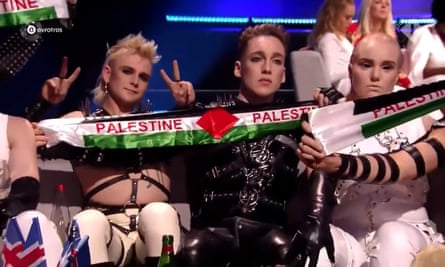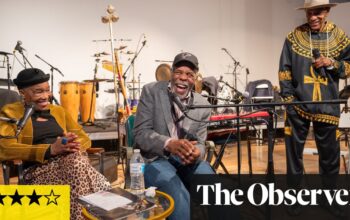W
When I relocated to England for my university education, I enrolled in a class about the European Union. My instructor’s initial statement was that if we wanted to understand the relationships between different countries, we should tune in to Eurovision. Therefore, as a diligent student, I tuned in to my first Eurovision song competition in May 2016. Unfortunately, just weeks before the UK’s referendum to exit the EU, I witnessed Joe and Jake’s disappointing placement of 24th out of 26 entries. Needless to say, I realized the lesson being taught that evening.
Subsequently, Eurovision became a revered annual ritual among myself and my companions- one that I must now forsake. Rather than tuning in to Eurovision this year, I will be participating in the protest against the song competition.
Israel has been granted permission to participate in the song contest by the European Broadcasting Union (EBU), the organizing body. This decision by the EBU goes against the very principles that the competition stands for – promoting peace, unity, and cooperation. This is particularly concerning given that approximately 5% of Gaza’s population was affected by the Israeli state’s actions a year ago, resulting in death, injury, or disappearance. With a death toll of over 30,000, how can a country responsible for such violence be allowed to compete?
Israel’s participation in this year’s contest exposes the double standards and glaring hypocrisy embedded in the EBU’s opaque processes for defining what counts as “political”. Just one day after Russia launched its invasion of Ukraine, the EBU banned Russian participation, stating that “in light of the unprecedented crisis in Ukraine, the inclusion of a Russian entry … would bring the competition into disrepute.”
The EBU has faced growing demands to disqualify Israel from participating in this year’s competition. Artists from Finland, Iceland, Norway, Denmark, and even the host country, Sweden, have all endorsed open letters calling on their national broadcasters to advocate for Israel’s banishment. Further, Iceland has expressed the possibility of pulling out entirely from the contest due to the situation. In addition, an online petition started in December, directed at the EBU’s director general, has amassed nearly 50,000 signatures.
In February, the lyrics of Israel’s first entry, “October Rain”, were leaked. There was a moment where it seemed like the EBU might reject Israel’s participation due to the ballad containing references to the 7 October massacre carried out by Hamas. This event has been used by the Israeli government to justify their ongoing offensive in Gaza, which goes against Eurovision’s rule of political neutrality.

Unable to display image in full screen.
Initially, Kan, the national broadcaster of Israel, was resistant and declined the EBU’s appeal to alter the song lyrics. The impasse was resolved when the country’s president, Isaac Herzog, stepped in to collaborate with Kan in modifying the lyrics to meet Eurovision’s requirements. The revised song, now titled “Hurricane”, has been given the green light by the EBU, securing Israel’s spot in this year’s competition. It is merely a coincidence that the new title rhymes with “October Rain”.
Despite the EBU’s attempts to explain the discrepancy in its treatment of Russia and Israel, it has failed to address the humanitarian crisis in Gaza. This has been particularly disappointing for Eurovision enthusiasts, myself included, as it presented an opportunity for the EBU to acknowledge and correct the past injustices associated with the competition. During the 2019 event in Tel Aviv, the EBU penalized Iceland’s broadcaster for the band Hatari’s display of a Palestinian flag, and also censored their protest in the official DVD recording.
Unfortunately, there is no morally or ethically acceptable way to view Eurovision in the current year. Despite trying to rationalize and justify its purpose, I am unable to find any logical reasoning behind it. Therefore, the only viable course of action is to actively boycott the event and take additional steps. In 2019, when Eurovision was hosted in Israel, individuals in London, Dublin, Ramallah, and Haifa organized a separate event called Globalvision on the same day. This alternative event aimed to bring attention to the occupation and promote the true principles of Eurovision – inclusivity and diversity.
I am optimistic that as we approach May 11th, the substitute Eurovision celebrations will resume and serve as a platform for us to direct our enthusiasm and aid. Locations that originally planned to broadcast the finale could instead utilize the opportunity to host donation events for groups such as Medical Aid for Palestinians. Ignoring this urgent crisis should be interpreted as being an accomplice – our actions carry greater weight than ever before.
Despite Eurovision’s claims of being apolitical, the competition has always been affected by political divides and issues of acceptance and exclusion. This was especially evident in the emotionally charged performances and songs of support for Ukraine in the last two years. Considering Eurovision’s history, it seems unlikely that this year’s event will allow similar expressions of solidarity for Palestine.
The current situation is that Russia and Israel are both committing unlawful acts by invading other territories. However, only one of them has been given the opportunity to showcase their talents to over 160 million viewers on the global stage. Why does the concept of “unity in music” only apply to Ukraine? As fans of Eurovision, if we truly want to uphold the values of peace and collaboration, our only option is to boycott.
-
.
Jeff Ingold is an independent journalist who reports on topics related to the LGBTQ+ community, as well as music and culture.
-
We want to know your thoughts on the topics discussed in this piece. If you’re interested in sending an email response with a maximum of 300 words to potentially be published in our letters section, please click the link.
Source: theguardian.com


